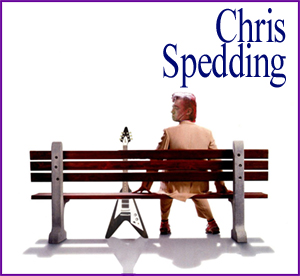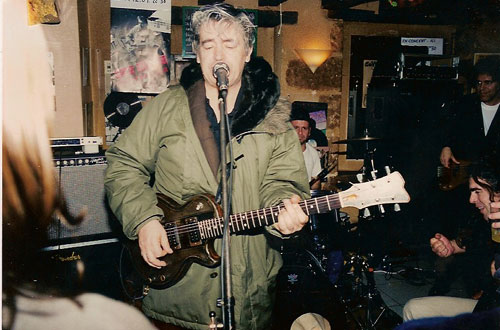
At the risk of having this large chunk of rock stride the pond and pummel me with his Flying V, I can’t help but think of Chris Spedding as “The Forest Gump of Rock.”
It seems unflattering, but I really don’t intend it that way. I’m not thinking of him as a borderline short-busser with high-water slacks. I’m thinking of him as a dude who has participated in an AMAZING amount of rock history and yet, other than weirdos like us, he’s fairly unknown. (At least in the US of A.)

Chris Spedding, “Motorbikin'”
I first read his name in college as I became enamored with Brian Eno’s Here Come the Warm Jets and saw his name on the back as playing on “Needle in the Camel’s Eye” and the “Paw Paw Negro Blow Torch”. I had no idea then and not much more of one until recently that this guy has done a wee bit more than that.
Early on Spedding, with his band Battered Ornaments, played THE Hyde Park concert in 1969 that featured the debut of the Brian Jones-less Rolling Stones. Bridge that with being the producer on The Sex Pistols demos and you start to get an idea of the breadth of experience here.
He has worked with so many amazing people that I’ll only list one for each letter of the alphabet (except x, y & z): Laurie Anderson, Ginger Baker, John Cale, Donovan, Drifters, David Essex, Bryan Ferry, Art Garfunkle, Nicky Hopkins, Kris Ife, Elton John, Dave Kubinec (featuring fifth Rutle Ollie Halsall), John Lodge, Paul McCartney, Harry Nilsson, Gilbert O’Sullivan, Pretenders, Dee Dee Ramone, Dusty Springfield, Johnny Thunders, Vibrators, Tom Waits.
His story is pretty damn cool and there’s some great stuff on his website chrisspedding.com and a 2006 biography, aptly titled Reluctant Guitar Hero, so I won’t belabor it. Rather I’ll just let the man speak for himself as he responds to our questions.


Great work, Sammy! Spedding’s final answer in Dugout Chatter made my day.
I’ll second that. I really enjoyed the interview, but I wanted to wait to comment because I wanted to click on all the cool extras. I like his sound. I’m gonna listen to Here Come the Warm Jets and pay a little extra attention. Thanks, sammy. That was really worthwhile!
His image being sort of a bad boy, it was a pleasure to find Spedding being such a gentleman in the interview.
I wonder if not calling early rock ‘rockabilly’ is an English thing, or who the ‘we’ is in “we never called it rockabilly.”
It’s good to know the secret to his sound (Gibson through a Fender no effects). Spedding is the only current player of a Flying V who comes to mind.
His work on those Island-era John Cale albums was incredible.
I loved his rockabilly answer. I’m not old enough to have been present at the genre’s purported birth, but I do recall its rebirth in the late-70s/early-80s. I find the term limiting and distracting, bringing to mind too many of the totemic items that followers of the Stray Cats cling to dearly. I always thought it was cool that Spedding played a Flying V. He played that stuff like it was ROCK ‘n ROLL, and it was cool to see that suspicion borne out in his comments.
I didn’t know he had a Bad Boy rep. From what Sammy told me, he was a total gentleman throughout the courting process. His story of jamming on Shadows tunes with Fripp was great.
I think one thing calling it rockabilly does is clarify that the music came from country music as much as R&B. The Brits and the revivalists tended to lose sight of rock’s country roots.
Oh, and the ‘bad boy’ comment was meant to imply that I was judging by his Look. I wrote the book on projecting ‘bad boy’ while being a sweetheart inside. Ok, maybe I just read that book.
BigSteve, your country roots comment is spot on. I got turned on to country in the 70’s and found that there was a lot to like (more to hate, but the stuff that feeds off the rock and roll mainline is great). All I ever hear from my classic rock loving friends is that rock came from the blues, and when I bring up the fact that all the studio guitar players from rock’s earliest days were white, country players they completely ignore me and tell me it’s all about Muddy and the Wolf.
I won’t deny that the blues are a huge part of rock n roll, but so is country. I think I tend to lean more towards the rock music that has less blues/more country.